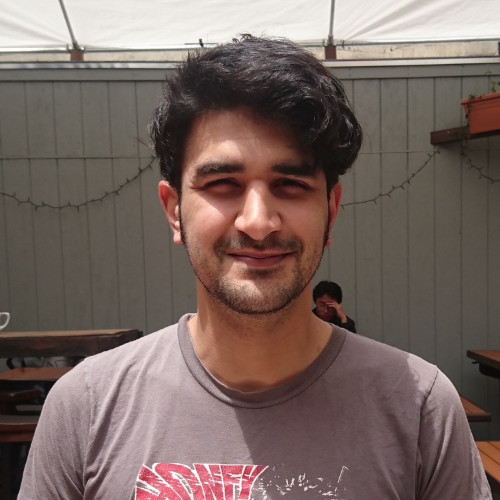Giraffes? Giraffes!'s Joseph Andreoli: "Our music is technical at times, it's dissonant at times, but there's this playfulness"
Loop-mad guitarist on his rig essentials and the future for the cult math-rock heroes
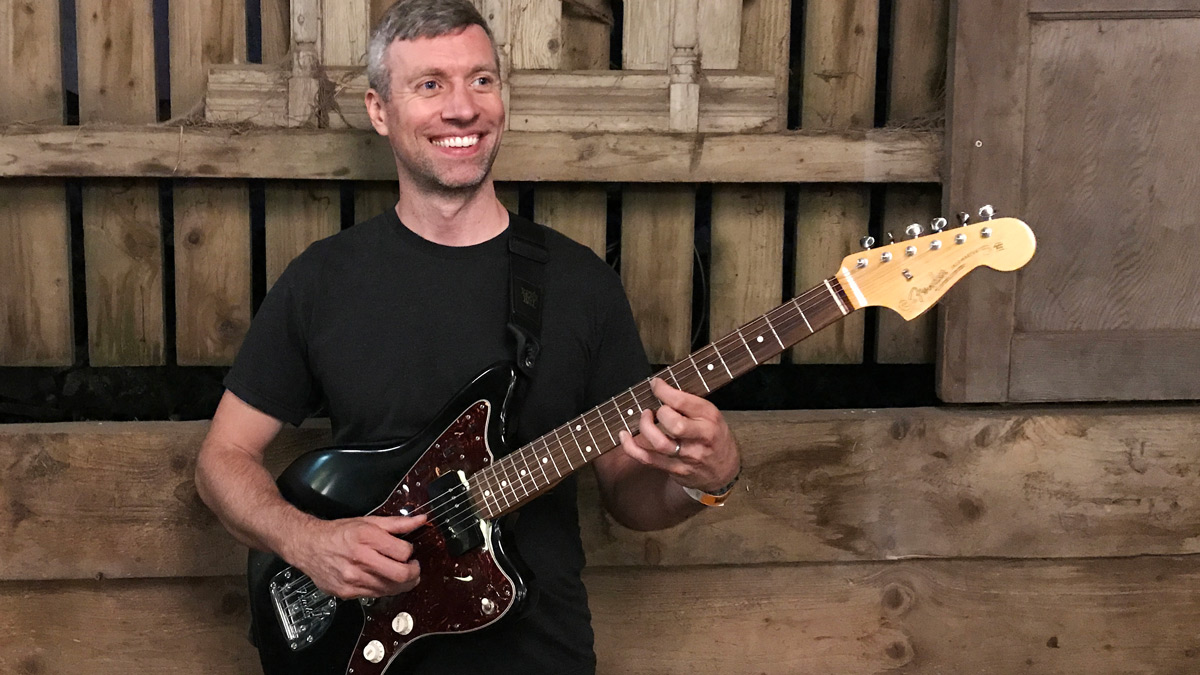
Want all the hottest music and gear news, reviews, deals, features and more, direct to your inbox? Sign up here.
You are now subscribed
Your newsletter sign-up was successful
After 17 years as a band, cult US math-rock heroes Giraffes? Giraffes! finally played their first ever UK show at this year's ArcTanGent Festival.
Cutting their teeth in front of thousands of fans would be a tall order for most bands, but G?G! - made up of drummer Kenneth Topham and guitarist Joseph Andreoli - took it in their stride. Despite blowing up a Marshall head mid-set and having to handle an on-the-fly looper reboot, the band delivered what was probably the performance of the weekend, while barely breaking a sweat.
MusicRadar caught Joseph shortly after watching their powerhouse set from side of stage, to talk guitars, amps, and the power of positivity.
Before coming over here, what were your expectations of today's show?
It's starting off as just a couple of guys banging around in a garage, and still feeling that way... but now in front of a few thousand people
"Honestly, I couldn't think that much about it going into it, because it's our first time playing in the UK; it's our first time playing a festival like this. We were totally excited to be coming here, but it was also like, an element of just being overwhelmed by just sort of how massive it is.
"I guess, for me personally, [it's] starting off as just a couple of guys banging around in a garage, and still feeling that way... but now in front of a few thousand people. It can be overwhelming to think about, so I try not to think about it."
How do you think the set went?
Want all the hottest music and gear news, reviews, deals, features and more, direct to your inbox? Sign up here.
"I felt great, I felt ecstatic. You know, I had that feeling when you're sort of out of your body and above yourself, just floating away in bliss."
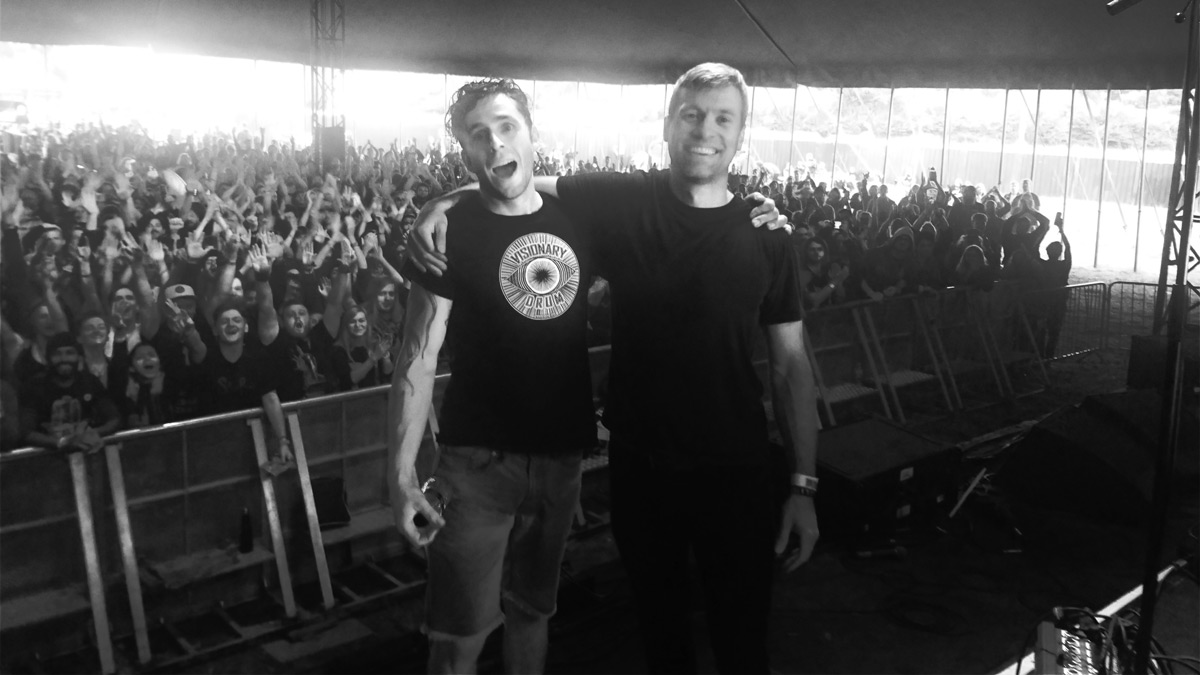
How do you feel about the fact that you've probably inspired a lot of the bands on the scene, and at this festival? Some bands, especially two-pieces like Cleft, have been and gone before you guys even made it over here - and now you're at ATG, the home for this kind of music. Is that weird at all?
"I would say it's slightly weird to think that we could influence people in that way. It seems strange to me, but any time that I hear about our music or our band influencing people in any sort of positive way, it makes me feel so happy to have done something that made someone feel good somehow.
"On this tour - we were touring the States before we came here - it was this theme that sort of came out. We like to talk to people after the shows, we're like, hanging out, because I love being with people, you know? It was this theme of people being like, 'I was in a dark place, and your music helped me get out of there.' At every show. Some shows there were like four people that would come up, four different people who don't know each other, saying that.
"It warms my heart to think that anything that I have done can make somebody feel good and make their life better somehow. It's like, I can die, because I've done something - I don't know, it sounds weird [laughs] but it's wild."
That sounds incredibly positive.
We never aimed to do anything, aside from making music and being happy together
"It's wild to think about, because I am just a regular guy. We're just a regular couple of guys playing music, and it's cool that people feel stuff from it, because we do. That's why we do it, and that's why we are so happy to do it.
"That's the goal: like, playing here is amazing, but we never aimed to play here, we never aimed to do anything, aside from making music and being happy together. Then it's like, 'Okay, let's record something,' and if you look at the trajectory of this band, it's a very non-traditional trajectory, and it's not like a 'how to be in a successful band'. We just said, fuck all that, we're going to do whatever we want, when we want it, as long as we're happy."
That comes out on stage as well - both the fun you're having and the energy between you as performers. You can tell that the two of you have been playing together for a long time.
"The type of music that we want to make is this fun music; it's technical at times, it's dissonant at times, but there's this playfulness that we like to have the whole time. Almost like, remembering that it's a game, this life is just like a fucking game that we're all playing. You can choose to play it however you want, but you're stuck playing the game no matter what. So, fill your life with fucking fun and positivity, because if not, then you're just wasting your time, y'know?"
Coming here, did you have an inkling that you had this kind of a following in the UK?
"Yes, to a degree. People were always like, 'you would do great in the UK,' or, 'they'd love you in Japan,' or whatever. It's kind of this abstract thing."
Have you been over to Japan?
"No, not yet."
Right, because... they would love you there.
"[Laughs] Right! See? Maybe we will, we've been talking to people. It's this abstract thing until you're really here, and you're like 'oh'. When ArcTanGent asked us, and treated [our first UK show] like such a big deal, then you're like, maybe it is a big deal [laughs]."
So what accounts for the big gap between albums?
"We had kids! [laughs] No, no seriously! I have one four-year-old, and Ken [Topham, drums] has one four-year-old and one one-year-old. Like I was saying before, we wanted to have a balance of things, we didn't want to be a band that's on tour forever, gone forever, we want to have families, we want to do that too. And you can, you can do both. It might look different than other bands, but you can do whatever you want to do, as long as you find that balance."
What is that balance?
"That balance is being realistic. Having a kid is tough! Having a baby is - you're not gonna want to practise, you're not gonna want to write songs. You're like, 'am I gonna get some sleep tonight?' So we took that into consideration with what we're doing. Granted, we could have worked harder, and got it out earlier. Definitely could have, and the next one will come out much more quickly."
How long were you writing for?
Ideally, the album would be taken in as a whole, but realistically, people won't do that, so we broke it up in different ways. There's the 37 tracks, then we merged those into six tracks
"It maybe took us two years. It started as like, the concept. The concept came first, really."
So what is the concept of the album?
"The concept of Memory Lame - it's a concept record, it really is, I'm not afraid! [laughs] There's a narrative, and it's the story of a person on a beach, having an experience. Something happens, they fall and they smash open their head on a rock. They're sort of bleeding out.
"That's what the album is, and what you get from that, and why it's called Memory Lame, it's an album about the mind and about your memories and truth versus fiction. Real experiences that you had, or maybe experiences that your mate has, but sometimes you appropriate things, something that you read or a movie that you saw that sort of blend into your own history. It's about that concept.
"This person is bleeding out, and what you have is my memories, Ken's memories, there's pop culture references in there, there's a lot of self-referential Giraffes? Giraffes! things in there, and musically there's parts that reference earlier works of ours, there's parts of the album that reference each other."
And the track listing is split into 40 or so parts?
"Yeah, yeah, 37, I think."
What inspired that? Is it part of the flow of the concept?
"Well, I wanted it to be fragmented like the mind. It's sort of like this nebulous thing, but you have these fragments of memories, these fragments of things, and I wanted to show that with the text. Not only in the music, which itself sort of has these fragmented pieces that work together as songs, that work together as a whole album.
"Ideally, the album would be taken in as a whole, but realistically, people won't do that, so we broke it up in different ways. There's the 37 tracks, then we merged those into six tracks, which are easier to digest."
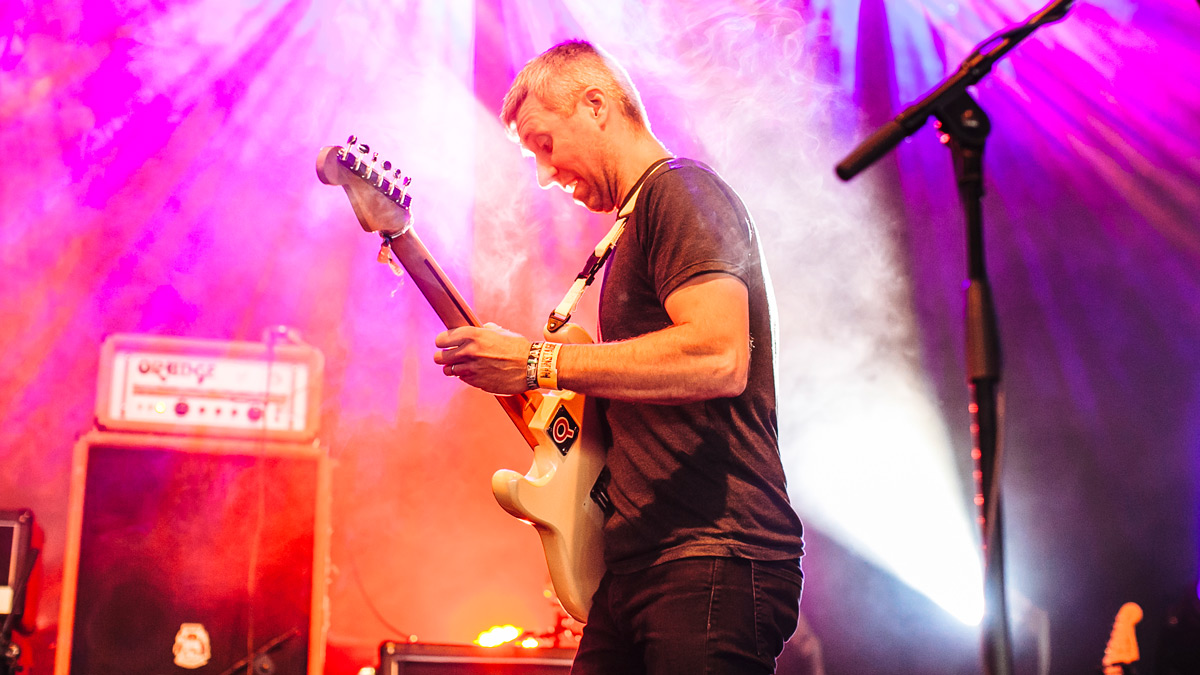
Did you record the album differently?
"Yes. Usually, we record drums and some guitar live, and then I would layer the extra stuff, the overdubs, on top of that. For this one, for the loop-based tracks, what we did was we built the songs first, built the guitar parts first, and then Ken would play to those recorded guitar parts.
"That was to give him a better idea of the intensity of the sections, so he could play how he wanted to play for real, in those moments, instead of me playing the basic guitar track and then being like 'now I have to step it up', things like that, to make it seem more natural for him, so the drums would be more organic."
And you're happy with the results? Would you do it this way again?
"I liked it a lot. I think it's an efficient way to make a record, especially since we make loop-based music. Not all of it is loops, but since we use so many loops, it makes sense to do that in the interest of time, and also money, when you're paying for studio time. We were able to, I'd like to think, retain a live feel for the album.
"Some of it is live, y'know, some of the things we did on the record we did together, and we're okay with it being different than our live show. Our live show is not like the record, and we're fine with that - it's a different thing. It's this whirling live show compared to this sort of, nicely tailored album."
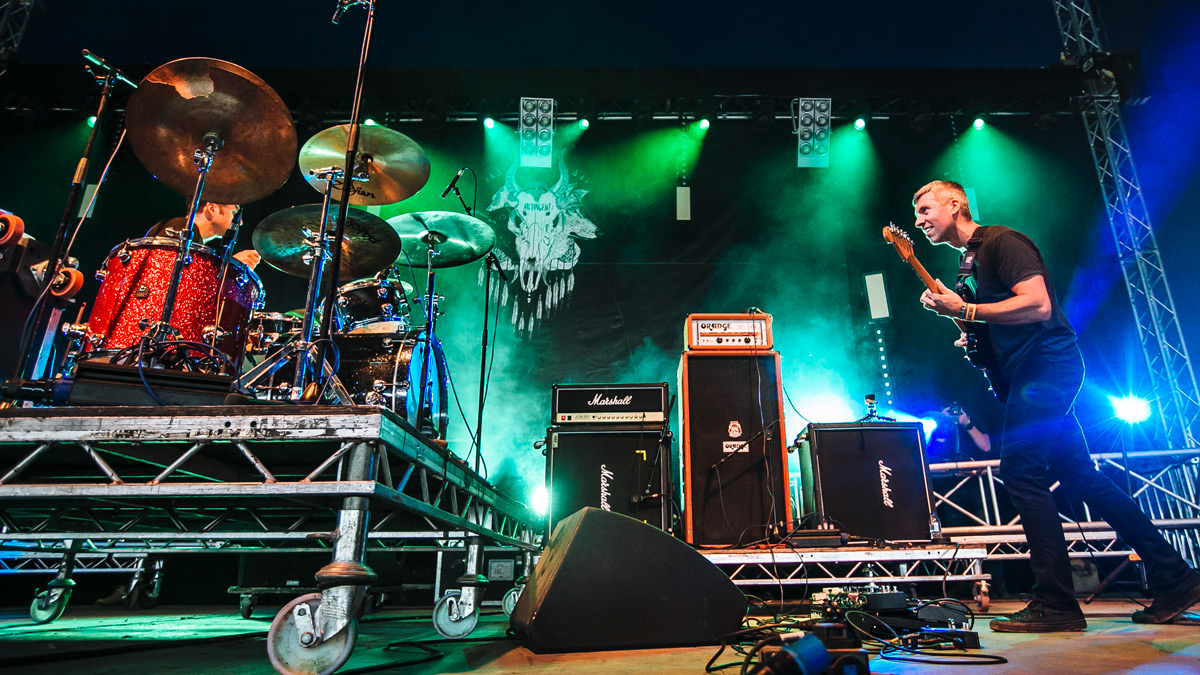
So today you've been using your Jazzmaster with a Marshall head, two 4x12s and an Orange bass amp, but that's not what you'd use back home. Talk us through your typical setup.
"My Fender Jazzmaster is my main guitar. I picked that up in maybe 2010. Well, let me back up. The first guitar I ever used in my life was my dad's 1972 Guild S-100, and that was just [amazing]. The humbuckers on that, and he had a Fender Super Reverb with the 4x10s, and I fucking loved that, it just sounded so great, it was so rock 'n' roll. He let me borrow it when I moved out of the house, and then I moved to California with it, so all the early Giraffes? Giraffes! stuff was written on this.
"Then I picked up a Fender Fat Strat, but it had a Floyd Rose, and I hated it. I hated it so much. So I got rid of that, and I ended up getting the Fender American Vintage Reissue Jazzmaster. I switched out the [pickups] for Curtis Novak Widerange humbuckers, because I wanted it to sound fatter and fuller, especially because it's a two-piece. You really need to fill out that sound."
What pickup are you usually on? Middle position?
I shrunk my pedalboard down to the smaller Pedaltrain from the Pro. It's hard, because I love all the little noisemakers, it's hard to make decisions
"All the way up. Neck, all the time. Even in the neck position, the brights are still good. With the Widerange, it sounds balanced. Then, having the bass feels good, especially when I kick on the octave, just to have some solid bass stuff going on."
Do you still tour with your dad's Guild?
"A couple tours ago, I was interested in the Guild S-100 reissues... [long, distracted pause as Joe notices the ATG bar is playing Giraffes? Giraffes! on the stereo] and I talked to them and they let me use a guitar on the tour, and I've had it ever since.
"For that one, too, I switched out - well, the stock humbuckers, I forget what they're called, they're trying to emulate the older Guild humbuckers, but there's some mojo, there's some shit about them that you can't get."
Is that just in your head though? Just because you think it's there, it is there?
"I don't know, I mean, I don't know. I A/B'd them in a blind test, and I could tell the difference, but I don't know, I'll bring them over and we can do another test! The [pickups] that come stock, they're really good, they're punchy and solid, but I wanted the wide range because I wanted to go a little bit lower, so I switched just the neck pickup, because I play mostly in the neck position, with another Curtis Novak Widerange."
You were saying earlier that you've downsized from a Pedaltrain Pro to a Pedaltrain 2. Is that the same in the States?
"For this tour that we're wrapping up now, there's been a bit of flying so I shrunk it down to the smaller Pedaltrain from the Pro. It's hard, because I love all the little noisemakers, it's hard to make decisions.
"I was rolling with the Boss RC-300, which is a massive looper - it's great, you can do so much with it, but I swapped that out for two RC-30s, and it's fun, it reminds me of what I used to use, starting out, [which] was an Akai Headrush and an RC-20. I swapped it out just to see what it would be like, as I knew I was going to fly, and it brought me back in time... it felt more organic, and a little risky."
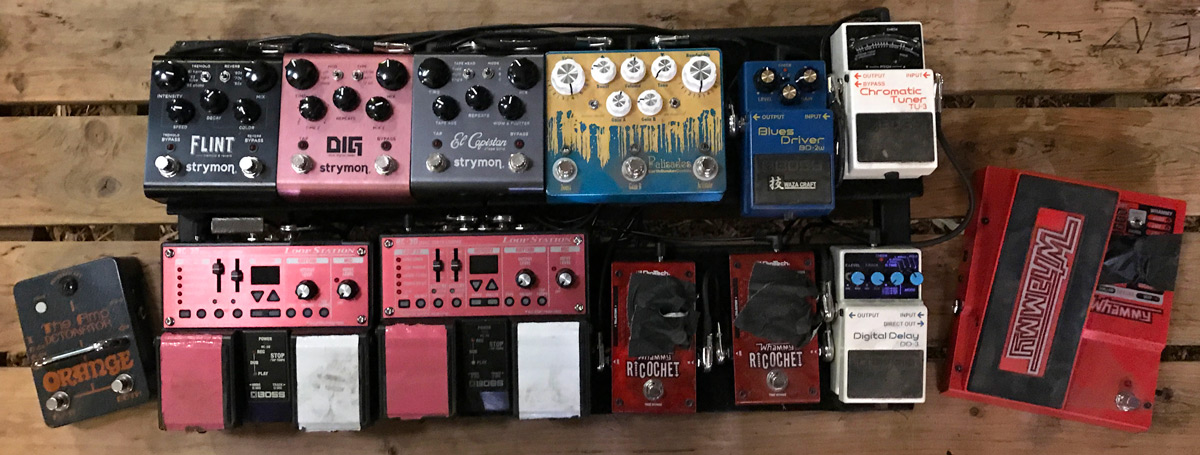
So you cut the RC-300 and a bunch of others. What stayed? What are the pedals you can't do without?
"The pedals that I came over with. The two RC-30s. I need to have two loopers, or the RC-300 - a lot of loops. I need a DigiTech Whammy."
You've got three of them!
"[Laughs] Yeah, I've got the one Whammy and the two DigiTech Ricochets. I only need one: the big Whammy. It's set to dry signal plus the octave down, or dry signal plus the octave up. Usually when I'm looping bass, I'll do the octave down,- for the octave up stuff, it's usually with the expression pedal, just to express it up. So that's essential."
What else is on the must-have list?
"Some sort of light boost/OD is essential. Right now, I've got the Boss Blues Driver, which is classic. I only started using it maybe less than two years ago."
And before that?
I love the Strymon stuff. I use the El Cap on this tour for a slight echo
"The OCD. The Fulltone OCD. That was good too, and I like it, but I switched over to the Blues Driver and I liked it a bit more because it's low break-up... From there I go to, right now, the EarthQuaker Devices Palisades; it's a Tube Screamer. Two Tube Screamer settings and a boost.
"I usually used, until I got that, a Made By Mike Dream Box... it's an MXR Distortion II clone that he tweaked and then the Big Muff with the op amp. The Billy Corgan! So it's Dream Box, as in Siamese Dream. I'm a big Smashing Pumpkins fan, and somebody just turned me on to it online and I was like, 'Oh, that's fucking cool.' For this tour, I wanted the boost option, too, so I brought the Palisades, but those I use interchangeably. I love them both.
"From there, I use the El Capistan - this isn't quite the routing, but I love the Strymon stuff. I use the El Cap on this tour for a slight echo; in the past, I've used it for bigger, spacier [sounds]. I've got the El Cap on for the slight echo, and I've got the Strymon DIG for the bigger stuff. That thing is so sweet - it's so clean, it sounds so good.
"I also use the Strymon Flint, which is the reverb and tremolo unit. The reverb I always have on. When I had the big 'board, I had the favourite switches for them, so I had extra settings. The tremolo I use sometimes, just for fun."
The two Ricochets you're using for momentary, almost sound-effect type ideas. Like punctuation to your riffs.
I could play the songs totally without the Ricochets, but it feels so good to be able to in the moment add some sort of expression, some sort of punctuation to the song
"Yeah, exactly! I wanted something, well, when you're downsizing, you look at your pedals and say 'what's extra?' - what is non-essential. In a weird way, they're not essential. I could play the songs totally without them, but it feels so good to be able to in the moment add some sort of expression, some sort of punctuation to the song.
"So I have the Boss DD-3 that's set to a super-fast repeat that gives me the glitchy stutter. You can do it with any digital delay that doesn't have trails, y'know? [Makes 'BRRRRRR' sound] Then I have one Ricochet just going [imitates a tape-stop sound], like a divebomb, only one octave down, no dry. The other one [is] one octave up, then I set the ballistics or whatever they call it to go at the speed I want to go."
You do quite a lot of tap-dancing when you get into the riffs.
"It's fun! I wanted to have a functional 'board, but I wanted to have fun. It's about having fun. Leaving these pedals on that I know aren't essential but that I know, when I'm on stage, I'm going to want something to mess around with, and have fun with."
So what kind of amp setup are you using back home? Obviously here it was rentals.
"It's an Orange AD140 and an Orange 4x12. That's been my go-to forever. When I first started, it was the Orange and a Marshall cab, a 1960, but then I switched over... lately I've been experimenting with dual mono into a bass cab too, just for those octave hits; it's so powerful.
"So I got the Orange Four Stroke 300-watt bass head and an Orange 1x15 bass cab. I picked that up in the last year, and I've been doing that at home. We did an East Coast tour with [another] band and I just used their bass rig, I think it was a Sunn and a 6x10, so I figured I'd just use that.
"Then on the West Coast we were with our friend Henry [Kohen], who plays as Mylets, and since it's just the two of us, just Ken and I in the van, usually the two of us and our equipment fits perfectly. I can also fit a bass amp on the East Coast, near where we live, but since Henry's just one person, he was using my gear, so instead of taking a bass amp, we were like, 'let's just take Henry with us!'"
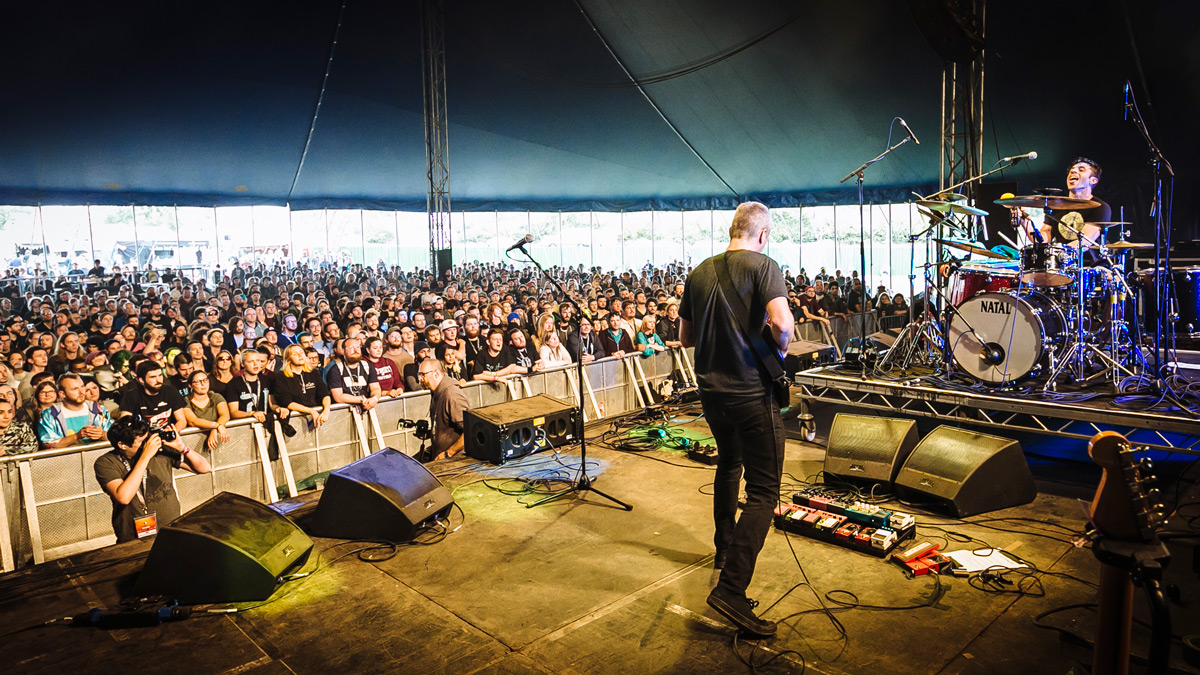
So you just had the one amp for that run? Did you drive across country to get there?
"Just the Orange, yeah. We flew across, and then did Seattle down to San Diego, nine shows. Orange flew out a cab; with the head, I went back and forth over what I wanted to do. I didn't plan it right. There wasn't enough of a window from the East Coast leg, so I couldn't fly my head out, and I already had so much gear that I didn't want to pay for more to carry on. The expenses started adding up, and I'm just like 'what if I had another AD140?' It sounds really posh, you know what I mean? [laughs] I bought myself a gift.
"I found this guy in Indiana that had one on Craigslist, because I couldn't find one on Reverb or anywhere, like in years past I've seen them on there, no big deal, they're around, but right when I wanted to buy one, I couldn't find one anywhere. Not eBay, not Reverb, so I was like 'fuck.'
"So on Craigslist in Indiana this guy had it, it was mint, and he didn't want to sell it to me, because he was like, 'Honestly, I don't want this amp to go on tour, because it's so nice,' y'know? So I'm begging him, 'I'll keep it in cases, it'll be good, I promise.' I bought it off him, and he shipped it off to Seattle. I picked that up in Seattle, Orange shipped out the 4x12, and that's how I had my gear on the West Coast."
That's wild. So, final question, Joe - what do you love about music?
"I love that it's a language. It's like a language that is beyond words, and you can say things to people that you couldn't say in regular spoken language, y'know? For me myself, it's easier to express my feelings with music than it is with words."
Memory Lame is out now via Topshelf Records.
Alex Lynham is a gear obsessive who's been collecting and building modern and vintage equipment since he got his first Saturday job. Besides reviewing countless pedals for Total Guitar, he's written guides on how to build your first pedal, how to build a tube amp from a kit, and briefly went viral when he released a glitch delay pedal, the Atom Smasher.
